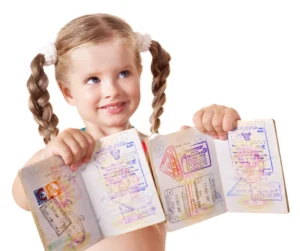Managing Your Children’s Passports After Divorce~3 min read
Divorce can be a complex and emotional process, especially when children are involved. One common concern among divorced parents is managing their children’s passports. In Texas, the rules regarding who can apply for a child’s passport and who retains it after a divorce are clear but require careful consideration. Understanding these rules can help you navigate this aspect of post-divorce life more smoothly.
Who Can Apply for a Child’s Passport?
In Texas, both parents generally have the right to apply for their child’s passport. However, the process involves specific steps to ensure both parents are aware and in agreement.

- Two-Parent Consent Rule: According to U.S. law, children under 16 years old must have the consent of both parents or legal guardians to obtain a passport. This means both parents must be present during the application process and provide their consent. If both parents cannot be present, the parent applying must provide a notarized statement of consent (Form DS-3053) from the other parent, along with a photocopy of that parent’s ID.
- Sole Custody Exceptions: If one parent has sole custody, they can apply for the passport without the other parent’s consent. This requires submitting a certified copy of the custody order proving sole legal custody. Additionally, if one parent is unavailable or uncooperative, the applying parent can submit Form DS-5525, explaining the special circumstances.
Retaining the Passport
After obtaining the passport, the question of who retains it often arises. In Texas, the decision is typically guided by the custody arrangement outlined in the divorce decree.
- Joint Custody Arrangements: In cases of joint custody, both parents are generally expected to cooperate regarding the child’s travel and passport. This usually means the passport should be kept in a secure, agreed-upon location accessible to both parents, or the parent who currently has physical custody of the child may retain it.
- Sole Custody: If one parent has sole custody, that parent typically retains the passport. The non-custodial parent may have specific rights to access the passport for agreed-upon travel, but this should be clearly outlined in the custody agreement.
Steps to Ensure Smooth Passport Management
- Clear Custody Agreements: Ensure your custody agreement explicitly states who is responsible for managing the child’s passport. Include details on how and when the passport can be accessed by the non-custodial parent if applicable.
- Communication and Cooperation: Maintaining open lines of communication with your ex-spouse regarding travel plans and passport usage can prevent conflicts and misunderstandings.
- Legal Assistance: If disputes arise, it may be necessary to seek legal advice or mediation to resolve them.
Contact Springer & Lyle
Managing your children’s passport post-divorce involves understanding and adhering to legal requirements and custody agreements. Always keep communication open with your co-parent and try to reach amicable agreements regarding your children’s travel documents.
If you have questions regarding your children’s passports post-divorce or need assistance with any family law matter, contact experienced family law attorney Daniel Abasolo at 940.387.0404 to schedule a consultation. Springer & Lyle is located at 1807 Westminster, Denton, TX 76205.






